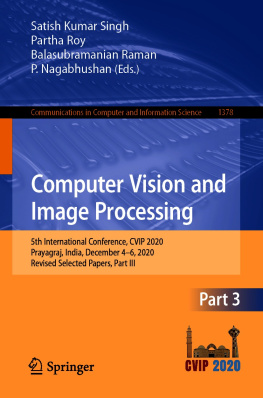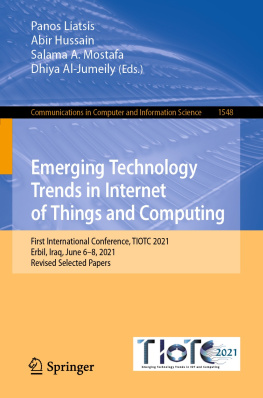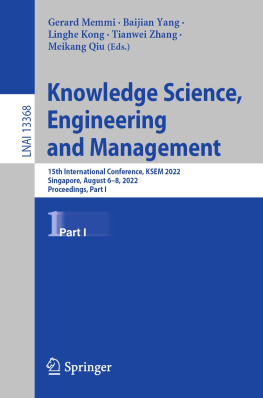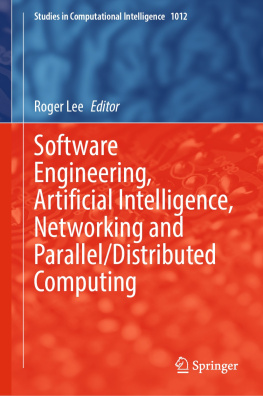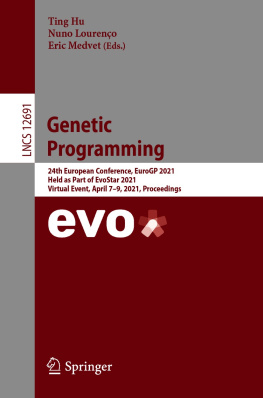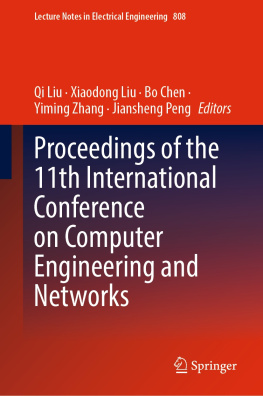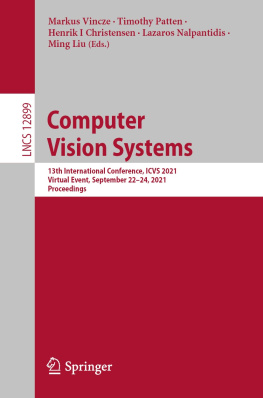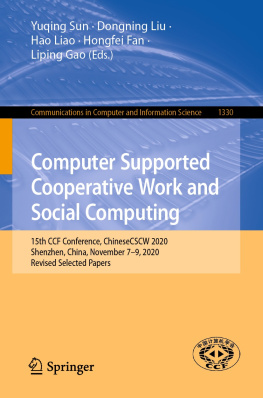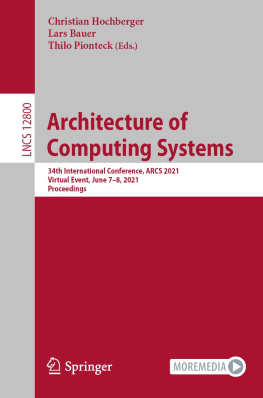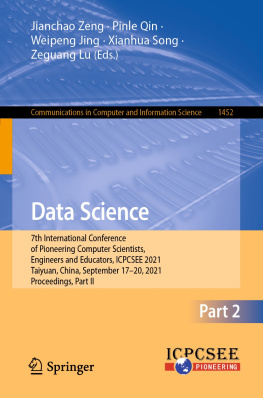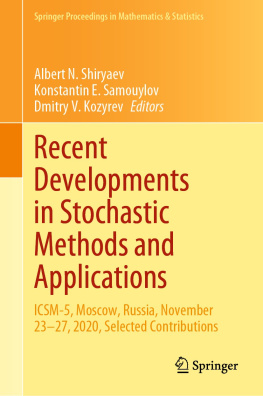Contents

Shawn X. Wang (Ed.)
Current Trends in Computer Science and Mechanical Automation
Selected Papers from CSMA2016 - Volume 1
ISBN: 978-3-11-058496-7
e-ISBN: 978-3-11-058497-4

This work is licensed under the Creative Commons Attribution-NonCommercial-NoDerivs 3.0 License. For details go to http://creativecommons.org/licenses/by-nc-nd/3.0/.
Library of Congress Cataloging-in-Publication Data
A CIP catalog record for this book has been applied for at the Library of Congress.
2017 Shawn X. Wang (Ed.) and chapters contributors
Published by De Gruyter Open Ltd, Warsaw/Berlin
Part of Walter de Gruyter GmbH, Berlin/Boston
The book is published with open access at www.degruyteropen.com.
www.degruyteropen.com
Cover illustration: cosmin4000 / iStock.com
Contents
Preface
The 2nd International Conference on Computer Science and Mechanical Automation carried on the success from last year and received overwhelming support from the research community as evidenced by the number of high quality submissions. The conference accepted articles through rigorous peer review process. We are grateful to the contributions of all the authors. For those who have papers appear in this collection, we thank you for your great effort that makes this conference a success and the volume of this proceeding worth reading. For those whose papers were not accepted, we assure you that your support is very much appreciated. The papers in this proceeding represent a broad spectrum of research topics and reveal some cutting-edge developments.
cover image processing, speech recognition, sound event recognition, music classification, collaborative learning, e-government, as well as a variety of emerging new areas of applications. Some of these papers are especially eye-opening and worth reading.
cover mostly navigation systems, unmanned air vehicles, satellites, geographic information systems, and all kinds of sensors that are related to location, position, and other geographic information. The articles in Chapter 4 are about sensors and instruments that are used in areas like temperature and humidity monitoring, medical instruments, biometric sensors, and other sensors for security applications. Some of these papers are concerned about highly critical systems such as nuclear environmental monitoring and object tracking for satellite videos.
Chapter 5 and 6 contain papers in the areas of mechatronics and electrical engineering. The articles in Chapter 5 cover mostly mechanical design for a variety of equipment, such as space release devices, box girder, shovel loading machines, suspension cables, grinding and polishing machines, gantry milling machines, clip type passive manipulator, hot runner systems, water hydraulic pump/motor, and turbofan engines. The articles in Chapter 6 focus on mechanical and automation devices in power systems as well as automobiles and motorcycles.
This collection of research papers showcases the incredible accomplishments of the authors. In the meantime, they once again prove that the International Conference on Computer Science and Mechanical Automation is a highly valuable platform for the research community to share ideas and knowledge. Organization of an international conference is a huge endeavor that demands teamwork. We very much appreciate everyone who is involved in the organization, especially the reviewers. We are looking forward to another successful conference next year.
Shawn X. Wang
CSMA2016 Conference Chair
Introduction of keynote speakers
Professor Lazim Abdullah
School of Informatics and Applied Mathematics, Universiti Malaysia Terengganu, Malaysia
Lazim Abdullah is a professor of computational mathematics at the School of Informatics and Applied Mathematics, Universiti Malaysia Terengganu. He holds a B.Sc (Hons) in Mathematics from the University of Malaya, Kuala Lumpur in June 1984 and the M.Ed in Mathematics Education from University Sains Malaysia, Penang in 1999. He received his Ph.D. from the Universiti Malaysia Terengganu, (Information Technology Development) in 2004. His research focuses on the mathematical theory of fuzzy sets and its applications to social ecology, environmental sciences, health sciences, and manufacturing engineering. His research findings have been published in over two hundred and fifty publications, including refereed journals, conference proceedings, chapters in books, and research books. Currently, he is Director, Academic Planning, Development and Quality of his University and a member of editorial boards of several international journals related to computing and applied mathematics. He is also a regular reviewer for a number of local and international impact factor journals, member of scientific committees of several symposia and conferences at national and international levels. Dr Abdullah is an associate member, IEEE Computational Intelligence Society, a member of the Malaysian Mathematical Society and a member of the International Society on Multiple Criteria Decision Making.
Professor Jun-hui Hu
State Key Lab of Mechanics and Control of Mechanical Structures, Nanjing University of Aeronautics and Astronautics, China
Dr. Junhui Hu is a Chang-Jiang Distinguished Professor, China, the director of Precision Driving Lab at Nanjing University of Aeronautics and Astronautics, and the deputy director of State Key Laboratory of Mechanics and Control of Mechanical Structures, China. He received his Ph.D. Degree from Tokyo Institute of Technology, Tokyo, Japan, in 1997, and B.E. and M.E. degrees in electrical engineering from Zhejiang University, Hangzhou, China, in 1986 and 1989, respectively. He was an assistant and associate professor at Nanyang Technological University, Singapore, from 2001 to 2010. His research interest is in piezoelectric/ultrasonic actuating technology. He is the author and co-author of about 250 papers and disclosed patents, including more than 80 full SCI journal papers and one editorial review for an international journal, and the sole author of monograph book Ultrasonic Micro/Nano Manipulations (2014, World Scientific, Singapore). He is the editorial board member of two international journals. Dr. Hu won the Paper Prize from the Institute of Electronics, Information and Communication Engineers (Japan) as the first author in 1998, and was once awarded the title of valued reviewer by Sensors and Actuators A: Physical and Ultrasonics. His research work has been highlighted by 7 international scientific media.
Professor James Daniel Turner
College of Engineering, Aerospace Engineering, Texas A&M University (TAMU), America Dr. James Daniel Turner is a research professor in College of Engineering, Texas A&M University (TAMU) from 2006 to current. In 1974, he received his B.S. degree in Engineering Physics in George Mason University. In 1976, he received his M.E. degree in Engineering Physics, University of Virginia. And he received his Ph.D. Degree from Engineering Science and Mechanics, Virginia Tech in 1980.
He has broad experience in public, private, and acedemic settings for working with advanced engineering and scientific concepts that are developed from first principles; modeled and simulated to understand the limits of performance; developed as hardware proto-types; tested in operationally relevant environments; and transitioned through partnering with industry and government to missions of critical national interest. Dr. James Daniel Turneris engaged in exploratory research where the goal is to transition aerospace analysis tools to bioinformatics. This research consists of applying multibody dynamics for drug design problems in computational chemistry, and most recently working with the immunological group at Mayo Clinic for exploring the development of generalized preditor-prey models for analyzing melenoma cancer in Human cell behaviors.


